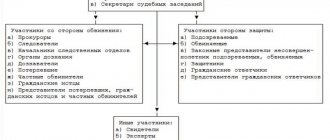Hi all! In this article we will talk about who the participants in criminal proceedings are. This small topic is included in the codifier of KIM Unified State Exam topics in society 5.16 “Features of the criminal process.” For example, they like to insert this topic into task 28, in which you need to plan a report. Yes, and in other tasks she can appear. Therefore, if your goal is maximum scores, then you need to study it.
So, let's go. First, we will briefly name and characterize the participants, and then describe their role.
Parties to criminal proceedings
From the prosecution side
All participants are divided according to the functional principle, that is, according to the role they play in the criminal process.
- Prosecutor. This is the official state prosecutor. He represents the state in court. At the stage of pre-trial proceedings (read more about the stages here), law enforcement agencies and investigative agencies provided him with a case: the result of a preliminary investigation. If he finds the evidence convincing, then he puts his visa on the case and from that moment on he defends the injured party on the prosecution side - he proves in court that it is the accused person who is the criminal.
- The victim is the person who actually suffered the damage: physical (for example, harm to health), property, moral. It can also be a legal entity if it has suffered property damage or damage to its business reputation. The victim can appear in court himself, or send his representative, file motions and challenges, provide evidence, etc.
- An investigator is a person who directly conducts a preliminary investigation. He can initiate a criminal case, carry out investigative and other procedural actions. It is clear that he is involved in the prosecution, collecting evidence and building a case, which is then handed over to the prosecutor.
- The head of the investigative body is essentially engaged in transferring specific cases to specific investigators and checking the materials of the criminal case. He is also obliged to check the evidence provided by the investigator for its legality and general existence. Has other powers. They are listed in Article 39 of the Code of Criminal Procedure of the Russian Federation.
- Inquiry body. These include internal affairs bodies, the federal bailiff service, and fire inspection bodies. An inquiry is a set of measures taken by the agency of inquiry within a certain period after the initiation of a criminal case.
- The head of the inquiry body leads the inquiry process.
- An investigator is a person who carries out investigative and other actions in order to collect evidence for a case. Roughly speaking, it establishes whether a crime took place?
- A private prosecutor is a person who files an application in court if the private rights of the victim have been violated. Want to know more? Then read on!
- A civil plaintiff is an individual or legal entity who may well be a victim and wants compensation for damage that occurred as a result of a crime. It is clear that the civil claim is being considered within the framework of civil proceedings.
- Representatives of the victim. These are persons who act in court on the side of the victim - these can be lawyers, jurists, etc.
From the defense side
Just a second. The defense is the side of the person accused of a crime. Next come the concepts and their classification.
- A suspect is a person against whom, in fact, a criminal case has been initiated. He could have been caught at the crime scene.
- The accused is a suspect against whom the investigating authorities have drawn up an indictment. It is the accused who is in court in the status of a defendant. The accused has all the same rights as his defense attorney (lawyer), he can speak in court, provide evidence (obviously of his innocence, etc.)
- Legal representatives of a minor suspect and accused. These are, of course, the parents of a child who has committed a criminal offense.
- A defense attorney is usually a lawyer, or another person altogether, who will speak on behalf of the accused and provide evidence of his innocence. A defender must be present in certain cases specified in Art. 51 Code of Criminal Procedure of the Russian Federation.
- A civil defendant is a person who is responsible for the harm caused by a crime. That is, this is not the accused, but a person who is related to the crime. Well, for example, citizen K committed a robbery at a store. And citizen C took advantage of the situation and took something from the store without paying.
- The representative of the civil defendant is again lawyers or other persons who represent his interests
Prosecution
Participants in criminal proceedings on the part of the prosecution are represented by citizens who have a certain status prescribed in the Criminal Procedure Code.
On the basis of this, all persons are divided into specific subjects of legal relations that arise when considering the case on its merits. The rights and obligations of participants in criminal proceedings in accordance with current regulatory legal acts and decisions are regulated by the court hearing. They must be fully protected and observed on the basis of the current articles of the Code of Criminal Procedure.
This is interesting! What are the statutes of limitations for criminal prosecution?
The prosecution may include:
- The prosecutor, as a participant in criminal proceedings, is responsible for the implementation of all established norms and monitors their implementation during the court hearing on a specific case. He is an active party who also has the status of a state prosecutor. The prosecutor must fully comply with the procedure and regulations of the prosecution established on the basis of the current articles of the Code of Criminal Procedure.
- The investigator, as a participant in criminal proceedings, belongs to the law enforcement agencies that conduct all cases until they are transferred to the state prosecutor. According to this, all materials before the trial are kept by the investigator. Upon acceptance of the application, he and collects all the necessary evidence for it.
- Those participating on the prosecution side include representatives of the investigative authorities. This structure is responsible for the necessary collection of information and conducting checks on the ongoing proceedings. They also take an active part in the process of returning the charges to the prosecutor to collect evidence and other types of information to return the case to court.
- In addition, investigators belong to the prosecution side . These are representatives of government authorities who carry out the necessary internal checks on the specific case under consideration. This party acts on the basis of orders and the Police Law, as well as the Code of Criminal Procedure.
- The main participants in the proceedings include the victim. This may be an individual, a legal entity or a representative from the state. It is these persons who are directly related to the acts committed by the accused.
- The prosecution often includes a person who independently applied to the courts to initiate criminal proceedings. A participant in criminal proceedings receives this status as a result of his own application. After this, the court decides to transfer the case to the relevant authorities and schedules a meeting where it establishes all the current facts and punishment. Additionally, a civil plaintiff may also be included here. This citizen must apply to the courts with a corresponding application.
The court, as a participant in criminal proceedings, considers a person’s appeal and initiates proceedings in cases involving the infliction of moral and material harm.
Important! The prosecution may include representatives of citizens who have the status of victims. This list of persons is extensive. These may include both lawyers from victims and representatives if the person is a minor.
Participants in criminal proceedings
Some important points
It is important to understand that criminal law protects not only public relations, that is, it is public, but also private rights and private interests. Well, look. There is terrorism. It is clear that there is a public interest here - the safety of society. But the lives of specific people are their right to life. Terrorists violate these rights, which means they encroach on private interests.
So, in any criminal case there are four possible options for combining private and public interest. At the same time, the prosecutor acts on the side of protecting public relations. And on the side of private relations, there is a private prosecutor. And in theory, if the court comes to the conclusion that only private interests have been violated, then the prosecutor is removed from the case and the case can be dropped.
So the options:
- The first option is when both public and private interests are violated. For example, cases of theft and theft. Here, of course, damage has been caused to the institution of private property, but the property of the victim itself - his property rights - is his personal interest. In such a case, the public prosecutor will play the main role, and the private prosecutor will have a place to be.
- The second option, in which damage is caused only to public interest. For example, these could be cases involving illegal financial and economic transactions, theft of money from the country's budget, etc. There is not and cannot be a private prosecutor.
- Third option. In such cases, only private interests are violated. For example, this is a case of beating, causing harm to the health of another person due to beatings, etc. The prosecutor is not involved here, but only a private prosecutor.
- The fourth option is when private rights and interests are violated, but the prosecutor gets involved in the case.
I think now the role of each participant in the criminal process has become clear to you.
Your task is to write in the comments examples of criminal cases for all four options for the relationship between public and private interests with references to the Criminal Code of the Russian Federation. Share on social media networks
Participants in the proceedings
The Code of Criminal Procedure, on the basis of the articles included in it, considers each of the parties to the process and establishes the current procedures and rules of conduct during the proceedings. Each of the participants has a definition and a specifically assigned function by the legislator during a court hearing.
The concept and classification of participants in legal proceedings is also established by the Code of Criminal Procedure.
Based on the current articles prescribed in the Code, all citizens, companies and government agencies registered in the country can become participants in such proceedings. Important! It is worth paying attention to the fact that participants may appear during the proceedings at the request of each party.
Therefore, the legislator proposes an expanded list of persons who may be present at the court hearing. The concept and classification of participants in criminal proceedings determines that the following parties may be admitted to the court specifically for the established proceedings:
- accusation;
- protection;
- neutral persons not related to a particular party who act as experts, etc.
Moreover, this list is divided into specific persons with their main responsibilities, rules of action and functions in a particular proceeding.
Citizens outside the proceedings
In addition to the persons presented above, there may also be other participants in criminal proceedings who can be appointed, but their presence may not be required. Usually these are people directly related to the case in question:
- Participants in the trial, who may be invited from each side, often appear as witnesses.
- The expert carries out actions based on his professional skills. Engaged by the court to draw up a report on the necessary materials that require professional consideration.
- Translators can also be included on the defense and prosecution sides. This category of citizens is provided if one of the parties does not speak Russian.
Important! The rights and obligations of participants in criminal proceedings must be respected regardless of the status or category of cases. The court and each of the representatives of the parties can invite only those persons who are directly indicated in the procedural documents.
All persons participating in the trial must be registered before the hearing of the case itself . The court must receive lists of persons to invite to consider all evidence and, if necessary, call them as citizens with certain statuses in court.
Participants in criminal proceedings
Regardless of the category of the criminal case, protocols must be maintained and all procedural actions prescribed in the Code must be observed. Violations of such meeting minutes are usually punishable by a fine. The procedure for bringing a person to justice can be open or closed. Each of the parties is invited to the consideration, which, in the process of analyzing the case on its merits, provides the necessary information to confirm its case.
This is interesting! How to correctly draw up and file a civil claim in criminal proceedings






